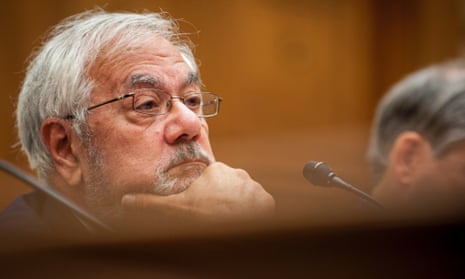On Wednesday, Congress celebrated the fourth anniversary of the Dodd-Frank financial reform act in its custom, by holding a completely pointless hearing. Even former Rep Barney Frank, whose name is on the bill, could barely stand the boredom.
Halfway through, Rep Michael Capuano directed a jovial question at Frank, slumped in his chair at the witness table even as legislators were throwing praise on him. The exchange went like this:
Capuano: Bahney, do ya miss us?
Frank: What?
Capuano: Ya miss us?
Frank: No.
It's hard not to feel for Barney Frank. In four stultifying hours of dead-eyed posturing, it became clear that the Congressional talk about financial reform is not a debate any more; it's a ritualistic chanting of calcified ideas.
Except, in this American saga of the financial crisis, there are no real heroes and the story has no action.
Wednesday's exercise in Washington illuminated our troubling national obsession with talking about "too big to fail" instead of doing something about it: we have admitted that we’re powerless over the financial system, that we have given up on improving banks and focused, instead, on what we should serve at the wake. The conversation about the financial crisis now centers around the funeral rites of banking – government bailouts and wind-downs, bankruptcies and living wills. As a result, what we call financial reform is becoming a death cult around banks.
We can turn this conversation around. What we talk about when we talk about financial reform should be how banks live: the best regulations and the most efficient ways to move money around the country, from bankers to people to companies, without destroying anything along the way.
Too big to fail is not a real problem. Banks are too interconnected to fail. They aren't so vulnerable to panics and crises because bankers and traders are reckless, cocaine-brained cowboys destroying whatever stands in the way of a great bonus. (Although that’s clearly an issue for some.)
One real problem is called short-term funding, and it's really what we should be talking about if we want to get past the bedtime stories about mortgage derivatives. At Lehman Brothers, it helped throw the entire financial system into disarray.
Here's the issue: Banks don't work in a vacuum. They borrow from each other every day. They have to: banks, by their nature, lend money on long-term projects and securities, and the money isn’t always in the bank at the end of every day. It's also cheaper to borrow money and securities for short periods of time; the interest rate is lower that way, like how a short-term car loan has lower interest rates than a 30-year mortgage loan. So banks borrow, overnight, from each other, to settle accounts and save themselves some money.
This day-to-day borrowing is how every single major bank gets through each day. In many cases, short-term borrowing can make up 70% of a big bank's daily book, according to Reuters. It defines the survival of the big banks: they use short-term money to extend daily loans to companies. You and I also benefit from short-term funding every day if we have investments in money-market funds, which are supposed to be as secure and short-term as cash ... yet still suffered a kind of bank-run panic after the collapse of Lehman.
Consider: it wasn't just bad mortgages that destroyed both Bear Stearns and Lehman Brothers. Instead, once rumors started to swirl that these banks were weak, other banks refused to lend them money day-to-day. The Federal Reserve, at the time, was not allowed to lend to those banks, so they slowly starved of money and had to be sent to the financial incinerator.
This is the fragility inherent in the financial system. It is based on trust, which makes it vulnerable to rumors and panics. The financial system gets shaky immediately when there’s even a whiff of panic. That's why short-term funding is a "structural vulnerability" of the financial system, as New York Federal Reserve president William Dudley has written – and he's right.
Regulators are trying to fix the problem. The financial crisis forced the Federal Reserve to change its rules so that it can provide emergency lending to all banks. Still, there's a significant amount of shame and panic that a bank signals to the market when it's forced to borrow directly from the Fed: yes, there's money available, but it doesn't look good to get it that way. The reputational issue around Fed borrowing is why a number of banks borrowed from the Fed during the financial crisis and went to great lengths to hide the fact.
Some regulators have focused on forcing banks to fatten up their "capital cushions" to withstand trouble. It's a good idea, but a limited one: banks won't survive long with a fatter capital cushion, the same way that eating a big meal won’t make you any less hungry the next day. The lack of short-term funding from other banks is like starvation to a bank.
But there is a better way – actually, several better ways. Regulators just have to get past the battalion of bank lobbyists trying to smack it down. The Fed has been focused on how to improve the $2tn short-term funding markets, but it has been held up, mainly by banks resisting it.
The Fed's proposed solutions include capping that intraday borrowing at 10% of a bank’s book. This is a good start, and the very minimum regulation that banks need if we want a living form of financial reform. It's time for regulators to tell the banks to get over themselves before the next crisis. They're like chronically sick patients who refuse to take their medication. Regulators have to force the issue.
Just as importantly, the terms of the debate about financial reform has to be turned around. Rep Capuano, looking visibly frustrated on Wednesday afternoon, asked aloud in the House chamber why we can't keep adding to Dodd-Frank's progress on financial reform with new legislation and oversight. There's no good reason we can't. Congress can tackle complex topics: Sen Carl Levin's permanent subcommittee on investigations has taken on everything from tax-dodging to JP Morgan’s London Whale debacle. Short-term funding is a worthy addition to that portfolio before the next financial crisis hits – and it will.
As Capuano noted: "This is one of those show-and-tell hearings with no purpose to it. I would have left already ... because this is going nowhere."
Wall Street is back to taking a lot of risk, day in and day out, and at some corner of the market another financial crisis is certainly brewing. Let's make sure the conversation about that goes somewhere.






